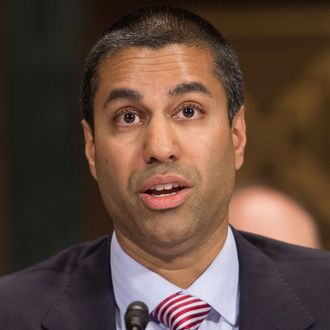
We knew the end of the open internet was coming. Now, it’s almost here. Ajit Pai, the current head of the Federal Communications Commission (and former Verizon Lawyer), announced Tuesday morning that he would undo the 2015 rules classifying broadband access as a type of utility. Politico reported on Monday night that Pai’s plan to undo net neutrality — a foundational concept to the open internet that hundreds of millions of American consumers, and businesses have relied on for decades — would be exhaustive.
In layman’s terms, net neutrality is the principle that internet service providers can’t charge their customers more money for certain websites or services, like Netflix or Facebook. (In Portugal, which doesn’t have legally enforced net neutrality principles, consumers pay their ISPs for packages almost like cable television — $5 extra for Google, Yahoo! and Wikipedia; $10 extra for YouTube, Netflix, and ESPN.)
Net neutrality is intended to protect consumers and businesses alike, denying ISPs the ability to rank or give preference types of traffic on their network. It’s what allows regular people to access any site they want, and what (theoretically) allows small businesses to compete against larger services. But the Republican-controlled FCC wants to make it easier for ISPs to play favorites.
The anti-consumer changes Pai will propose undo the 2015 order, and go a step further. The policies that Politico is reporting are nothing less than a total surrender to private industry by a major regulatory body. In addition to undoing the Open Internet Order:
Pai also will follow through on his plans to scrap the legal foundation that the FCC’s old Democratic majority adopted in 2015 to tighten federal oversight of ISPs, a move he contends has deterred the industry from investing in broadband networks. Internet providers have feared that legal foundation, if left in place, could set the stage for possible government price regulation of internet service.
First of all, ISPs themselves have said that the net neutrality rules haven’t hurt investment in broadband. Secondly, Americans pay some of the highest broadband prices in the world for some of the worst service. Internet access should be regulated like a utility, and that means not letting broadband providers — most of which have regional monopolies and no competition — charge exorbitant prices. In the Wall Street Journal today, Pai wrote that instead of actual protections, “the FCC simply would require internet service providers to be transparent so that consumers can buy the plan that’s best for them.” So at least you’ll know when your ISP, which you probably have no choice in, is giving you a raw deal.
But wait! In addition to destroying net neutrality, Pai will also propose getting rid of “the so-called general conduct standard, which gives the FCC authority to police ISP behavior it deems unreasonable.” To put it plainly, the FCC just doesn’t want to do anything and is following the telecom industry talking point on booting authority to the FTC. Despite widespread support for the net neutrality rules among individual consumers of all political leanings and prominent internet companies alike, the FCC is firmly in the pocket of the telecommunications industry, whose response to most concerns is “just trust us.” (There is plenty of precedent for why you shouldn’t.)
Pai, who has preached about a transparent and open process, is reportedly planning to announce these changes tomorrow, two days before Thanksgiving when everyone is definitely paying attention. Pai announced Tuesday morning that he would release the full plan at least three weeks before the mid-December vote, as if lead time is the big problem everyone has with this policy. The FCC will vote on the proposal at its December 14 meeting.





























